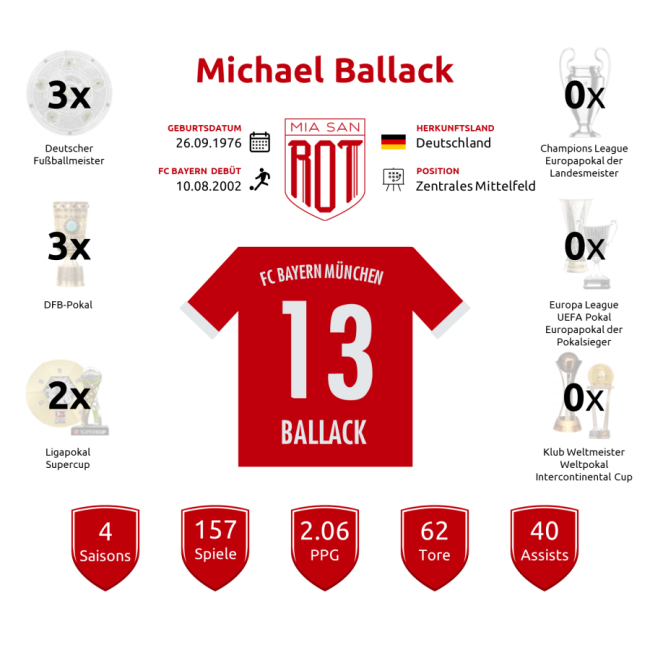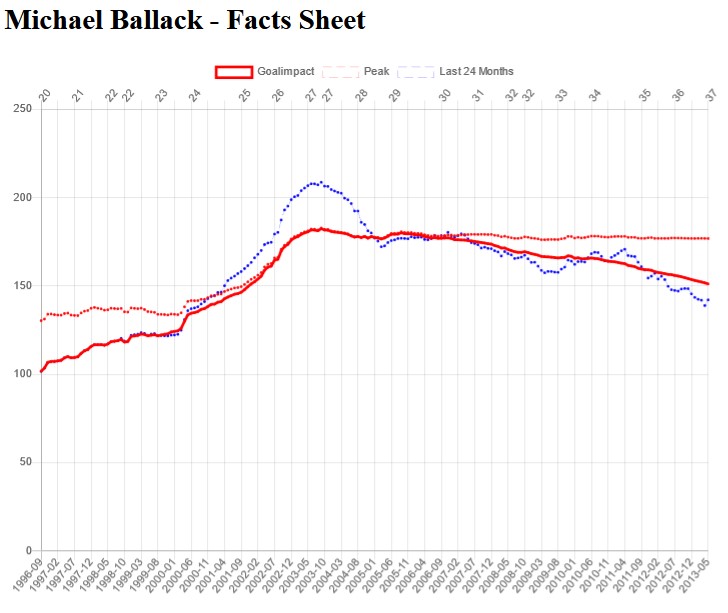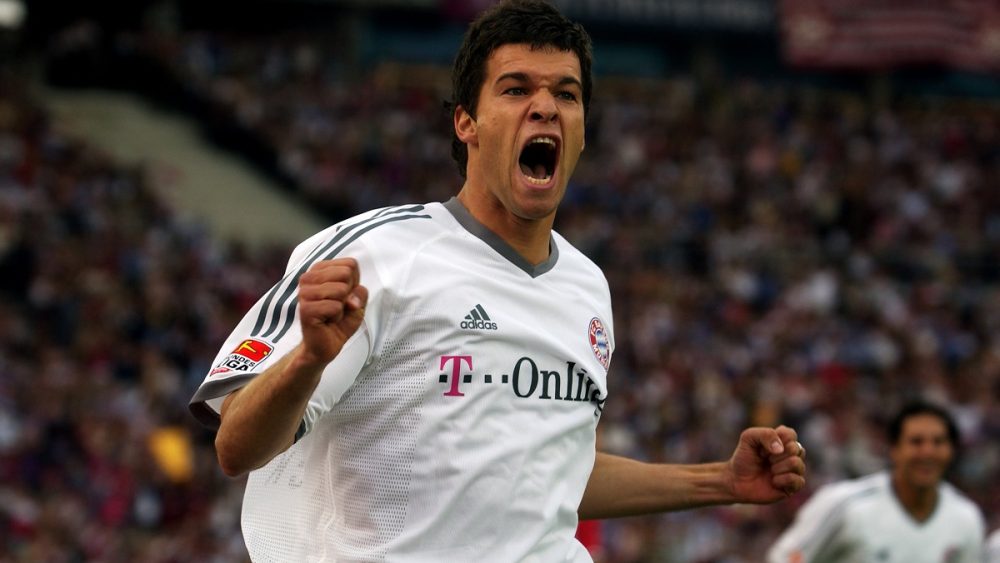FC Bayern – Miasanrot Advent Calendar, Door 13: Michael Ballack
In the end, Michael Ballack only played four years in Munich. Nevertheless, he left his mark on the club like no other player during this period, a club which was caught in no-man’s land between national strength and international weakness. But his influence on the record champions began years earlier.
PERENNIAL SECOND PLACE WITH BAD LUCK BEFORE BAYERN
In May 2000, Bayern needed a miracle to still become German champions. A miracle in the form of support from their own region, as Unterhaching were playing against shoo-in champions Bayer Leverkusen, whose lead was virtually unassailable. But the support came from Ballack, who scored an own goal to give the underdogs a 1-0 lead. The rest is history. Bayern became champions and Ballack became the “unluckiest man of the nation”.
Two years later, Ballack and his Leverkusen team had finally seemed to draw level, nay, even surpass FC Bayern on multiple fronts, but once again everything was to go against him. In the league, they blew the season finale and finished second. Schalke were too strong in the DFB-Pokal final and in the Champions League Zidané sent Bayer into an emotional nadir with what was probably the most beautiful final goal of all time. Three runner-up places in one season – the myth of Vizekusen was born.

But that was not enough, because in the same summer, the native of Görlitz was to become runner-up once again. At the World Cup in Japan and South Korea, Ballack was the captain in Germany’s engine room. In the quarter-finals and semi-finals, the midfielder scored the decisive goal each to give the Germans a 1-0 victory. However, after he was given his second yellow card in the semi-final against hosts South Korea, he had to watch from the stands in the final as Ronaldo fired Brazil to world championship glory.
IN MUNICH WITH HIS HEAD TO THE TRIPLE-DOUBLE
After the World Cup, Ballack moved to Munich together with team-mate Zé Roberto and the most promising talent of the time, Sebastian Deisler. The summer of 2002 could have been the club’s best transfer period. When Lúcio also moved to the club on the Isar two years later, the Vizekusen axis was once more reunited.
In his very first year, Ballack met his former club Kaiserslautern in the DFB-Pokal final. On the biggest national stage, the new Munich player did what he did best: Score. Bayern’s opening goal from a header is emblematic of Ballack, who was often able to use his aerial supremacy to devastating effect. In the time between Dieter Hoeneß and Robert Lewandowski, Ballack was probably the most dangerous header for Munich.
But his goals were not limited to headers alone. When he had to, Ballack could also use his technique, as in the following scene with his goal of the month in February 2006 against his old colleagues from the Werkself.
In his four years at Bayern, Ballack won three domestic doubles and scored 62 goals in 157 games, 44 of which came in the Bundesliga. He often scored the important goals. In the 2005/06 season, he was as decisive for Bayern’s success as Lewandowski, Gomez or Toni in their prime.
Nevertheless, Michael Ballack’s time came to an inglorious end. Almost from the beginning, there were tensions behind the scenes, as the national player continually courted the idea of a move abroad, which on several occasions almost happened too. At the end of 2005, the board publicly withdrew an offer to extend his contract at “outstanding figures” to the applause of the fans at the annual general meeting. In the summer of 2006, Ballack joined the newly rich Chelsea FC.
NO LUCK AFTER BAYERN
Before joining the club in Stamford Bridge, however, the “capitano” was born. In his first game as national coach, Jürgen Klinsmann had already removed Bayern keeper Oliver Kahn as captain and promoted his former teammate Ballack. At the World Cup in his own country, Ballack once again became a tragic figure. First the German tabloid press feared for the “nation’s calf”, then Klinsi’s boys became a summer fairy tale before Fabio Grosso abruptly squashed the dreams of an entire country.
Two years later, at the European Championships in neighbouring Switzerland and Austria, Ballack scored the all-important winning goal with a direct free kick to advance bis team to the quarter-finals. But in the final, a Spanish team at the beginning of its heyday was totally superior to the Germans in all respects. Once again, Ballack only came second.

(Source: Goalimpact)
The feverishly desired triumph of an international title also wouldn’t come with Chelsea. In his first season, the Blues reached the Champions League final and Ballack even converted the first penalty of the shoot-out. But when John Terry slipped and missed his penalty to seal Chelsea’s defeat, Ballack sank to the ground in midfield in bitter disappointment. A year later, when Henning Övrebö failed to call a penalty against Barcelona in injury time of the semi-final second leg, Ballack chased him halfway across the pitch. But even that was not enough.
Ballack’s ultimate departure was a particularly bitter one. Before the 2010 World Cup, Kevin-Prince Boateng tackled him fiercely. When it became clear shortly afterwards that Ballack would be out for the World Cup, Lahm became captain and an unleashed German team showing refreshing football came third in the World Cup. Ballack left the international stage through the back door – after 98 international matches without a farewell.
So what remains of Michael Ballack? At FC Bayern, he is emblematic of the great player of a time when the team did not play a role internationally. Ballack was the only one in the team who could be described as a consistent world-class player. In addition to his short tenure at the club, however, his permanent quarrels with club management just so tilt the scales towards preventing him form joining the circle of club legends.









